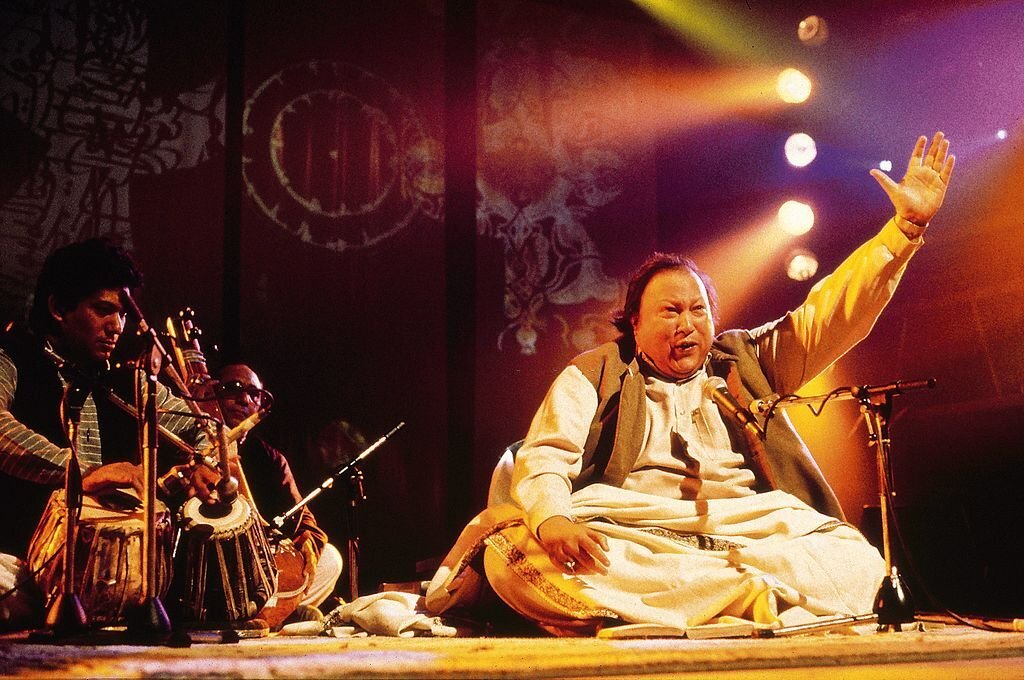
There is a famous saying that good human beings live a shorter life and bad people are given a longer life span by God to be able to come to the right path even at the end of their lives. Good human beings are not only those who are religiously inclined but also those who are completely sincere to their profession.
Some people reach a certain position in their careers and are stopped from going onwards from that point because if they would have been allowed to go beyond that point, they would have achieved something unimaginable to the human mind and senses.
One such person was Pakistan’s only internationally-acclaimed musician up till now, Nusrat Fateh Ali Khan, whose legendary journey with music was cut short by cardiac arrest on August 16, 1997 at the age of 48 because if he was allowed to carry on, music might have been completely different from what it is today. He had the ability to change the way music is treated to and listened to around the world because he had made the musical form of qawwali world-famous with his utmost devotion and the power to capture the other person’s mind. As we commemorate his 17th death anniversary, it’s time to recollect those extraordinary powers which had been enabling him to make the world dance to his tunes from Japan to the US.
Born into a family of qawwals from Faisalabad, Nusrat resisted his father’s wish to become a doctor and continued with the family profession. Performing at Rishi Kapoor’s wedding in 1980 on request of the legendary Raj Kapoor brought him international fame overnight and he never looked back after that. Considered one of the greatest voices ever recorded, he possessed an extraordinary range of vocal abilities and could perform at a high level of intensity for several hours. His greatest gift was the ability to fuse Western music with Eastern music and set new examples in this regard.
Nusrat was the very first musician to compose music for films in Hollywood, Bollywood and Lollywood. His vocal abilities were so strong that he had performed for 10 hours at a stretch leaving the audience listening to him in total disbelief. Wherever Nusrat sang, he mesmerised the audience so much that despite the fact that they were not able to understand what he was singing, they were forced to stand up and dance and completely forget the surroundings around them.
His face resembled that of a Japanese saint, which made him hugely popular in Japan and he always made a point to visit Japan for his concerts and events. Known as the Elvis Presley of the East, many international musicians repented not working with him after his death and that included the illustrious Michael Jackson and Madonna. AR Rahman claims to be a big fan of Nusrat and repents that he couldn’t work with him after his mainstream Hindi album Vande Mataram on which Nusrat had collaborated with him.
Nusrat was a musician of his own choice and never worked for only money or fame. Despite having offers all the time from all around the world, he remained choosy in his work and only worked when felt right. This shows that he was a passionate musician who only worked when his heart and mind allowed him to work. Keeping in mind all the offers which piled up his door, he could have worked around the clock just to get quick fame and earn money but he was true to his roots and never overexploited his talent.
His death created such a vacuum on the international music scene that no one was able to fill it despite the passage of so many years. Nusrat’s departure was an even greater blow for the Pakistani music industry, as the country wasn’t able to produce anyone like him afterwards. Although many Pakistani musicians have worked in India but the international touch which Nusrat had is clearly missing from their work. Maybe these musicians know that Nusrat has left big shoes to be filled and no one among them is capable of doing so. Even today in the West, people identify Pakistan as the country of Nusrat Fateh Ali Khan as if Pakistan doesn’t have any other recognition in the West.
When countries are recognised from the success of its artists, it means that the countries are indebted to those artists and certainly Pakistan is indebted to Nusrat Fateh Ali Khan. Artists and sportsmen are true ambassadors of their countries and Nusrat was no doubt a great ambassador of Pakistan. He never thought of pleasing India despite the fact that he worked a lot over there. Nusrat sang for the Kashmiri freedom movement with his number JAANE KAB HOGE KAM, which angered Shiv Sena head Bal Thackeray, who used to host Nusrat every time he visited India. A true patriot, Nusrat never thought that singing for the Kashmiris would hurt Thackeray and remained true to the national cause. His decision to sing for the Kashmiris ended his relation with Thackeray but Nusrat remained proud of his decision. Nusrat never sought permanent residence in India and was loyal to his native roots in Pakistan. He set standards for other Pakistanis, especially artists, to follow and those who followed him found a great place and the others fizzled out in a couple of years.
Despite his death, Nusrat’s work went on releasing until 2005, as various music labels all across the globe released his albums which he had finished before his death but couldn’t release it due to his ill health. That meant that money kept in pouring to his family despite his demise. The same case happened with Michael Jackson as after his death in 2009 his unfinished work was released worldwide bringing his family the much needed money it needed to pay off the huge debt the legendary singer was under.
As Nusrat continues to play his tunes in the world for which he left this world, we continue to dearly miss him and render lines of one of his famous qawwalis hoping that he might come back again, AAJA TENU AKHIYAN UDEEK DIYAN!
The writer is a freelance journalist and can be reached at [email protected]





